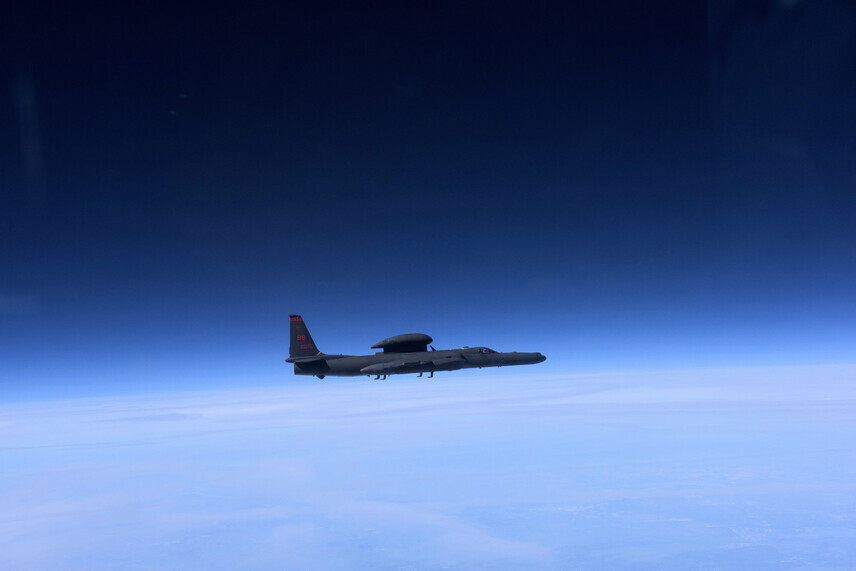hankyoreh
Links to other country sites 다른 나라 사이트 링크
Home to US bases, S. Korea runs risk of being drawn into possible US-China conflict

As cross-strait tensions continue to rise with the intensifying frictions between the US and China, former US generals and officials have been publicly suggesting the possibility that US forces stationed in South Korea could be deployed if an armed conflict erupts in the Taiwan Strait.
South Korean President Yoon Suk-yeol and the Ministry of National Defense have dismissed the possibility, stressing that US Forces Korea’s top priority is deterring a North Korean invasion. But some analysts are suggesting an institutional framework for discussing the scope of USFK activities will need to be established between Seoul and Washington if the former is to avoid getting drawn into an unwanted conflict.
When asked during a regular briefing Tuesday about the possibility of USFK or South Korea becoming involved in an emergency involving Taiwan, US Defense Department Press Secretary Brig. Gen. Patrick Ryder replied in generalities.
“US Forces Korea remains committed to the US-ROK alliance and maintaining the high level of readiness and robust combined defense posture to defend ROK’s sovereignty and to support US national interests in the region,” he said.
But the predictions of former officials differed from the US government’s official position.
Gen. Robert Abrams, who served as USFK commander until July 2021, told Radio Free Asia on Monday that the deployment of USFK in the event of a Chinese invasion of Taiwan was “possible.”
“[T]he US will preserve all options in determining what forces might be used in that scenario, including those assigned to USFK,” he explained.
David Maxwell, a senior research fellow at the US Foundation for Defense of Democracies and a former South Korea-US Combined Forces Command operational advisor, told Voice of America on Sept. 1 that the US had the authority to redeploy its forces in the event of an armed clash in the Taiwan Strait. He also referred to past examples of the redeployment of some USFK troops in the Iraq War and the war on terror in Afghanistan.
US experts predicted that US Air Force troops in Pyeongtaek, Gyeonggi Province, and Gunsan, North Jeolla Province, are especially likely to be deployed to Taiwan. In this scenario, the USFK bases would become launch bases for scrambling aircraft to attack or counter China. If China responds with a retaliatory strike against a USFK base, this could lead to a situation where South Korean troops with the Combined Forces Command end up fighting Chinese troops.
On five occasions since Korea’s liberation, the US has decided major policies regarding USFK reductions and redeployments without discussing them with South Korea. In contrast, a prior discussion system has existed since 1961 in Japan, due to fears that US Forces Japan and Japanese troops might be drawn into a “Far East situation” involving the Korean Peninsula or Taiwan.
“We need to come up with a plan for sovereign controls on US military forces using USFK bases on South Korean territory based on the content of the joint statement on their strategic flexibility agreement in 2006,” urged Cheong Wook-sik, director of the Hankyoreh Peace Institute and the Peace Network. That joint statement reads, “In the implementation of strategic flexibility, the US respects the ROK position that it shall not be involved in a regional conflict in Northeast Asia against the will of the Korean people.”
When asked by the Hankyoreh on Wednesday whether a framework exists for institutional discussions between Seoul and Washington on the deployment of USFK troops outside the Korean Peninsula, the South Korean Ministry of National Defense replied, “Changes in the force posture, including reductions and increases in US Forces Korea troops, are a key issue, and South Korean and US military authorities are coordinating closely on it.”
By Kwon Hyuk-chul, staff reporter
Please direct questions or comments to [english@hani.co.kr]

Editorial・opinion
![[Guest essay] Preventing Korean Peninsula from becoming front line of new cold war [Guest essay] Preventing Korean Peninsula from becoming front line of new cold war](https://flexible.img.hani.co.kr/flexible/normal/500/300/imgdb/original/2024/0507/7217150679227807.jpg) [Guest essay] Preventing Korean Peninsula from becoming front line of new cold war
[Guest essay] Preventing Korean Peninsula from becoming front line of new cold war![[Column] The state is back — but is it in business? [Column] The state is back — but is it in business?](https://flexible.img.hani.co.kr/flexible/normal/500/300/imgdb/original/2024/0506/8217149564092725.jpg) [Column] The state is back — but is it in business?
[Column] The state is back — but is it in business?- [Column] Life on our Trisolaris
- [Editorial] Penalties for airing allegations against Korea’s first lady endanger free press
- [Editorial] Yoon must halt procurement of SM-3 interceptor missiles
- [Guest essay] Maybe Korea’s rapid population decline is an opportunity, not a crisis
- [Column] Can Yoon steer diplomacy with Russia, China back on track?
- [Column] Season 2 of special prosecutor probe may be coming to Korea soon
- [Column] Park Geun-hye déjà vu in Yoon Suk-yeol
- [Editorial] New weight of N. Korea’s nuclear threats makes dialogue all the more urgent
Most viewed articles
- 1Behind-the-times gender change regulations leave trans Koreans in the lurch
- 2Yoon’s revival of civil affairs senior secretary criticized as shield against judicial scrutiny
- 3Family that exposed military cover-up of loved one’s death reflect on Marine’s death
- 4Marines who survived flood that killed colleague urge president to OK special counsel probe
- 5A breath of fresh air: Innovative architecture in the time of COVID-19
- 6‘Weddingflation’ breaks the bank for Korean couples-to-be
- 7South Korean ambassador attends Putin’s inauguration as US and others boycott
- 8Japan says its directives were aimed at increasing Line’s security, not pushing Naver buyout
- 9Mother of Sewol victim travels 3,100km in 21 days to raise awareness about investigation into ferry
- 10Dermatology, plastic surgery drove record medical tourism to Korea in 2023